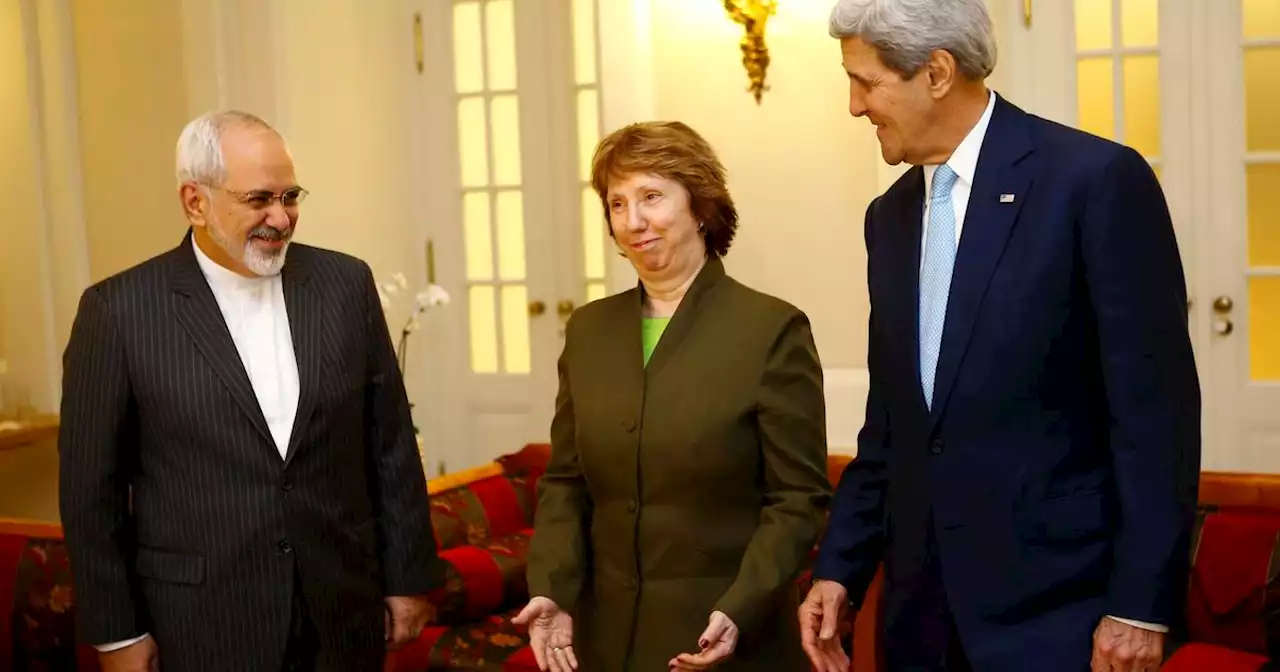Ashton provides an insider's view of several high-stakes diplomatic engagements, including the early days of forging the Iran nuclear deal and the EU-brokered talks between Serbia and Kosovo.
MICHAEL MORELL: Cathy, welcome to Intelligence Matters. It's a real honor to have you on the show.MICHAEL MORELL: So, Cathy, you just published a new book - your memoir from your time as the EU's foreign policy chief. It's titled,"And then what? Inside Stories of 21st Century Diplomacy." So congratulations. It's fantastic.MICHAEL MORELL: Cathy, because of the way we tape these episodes here at Intelligence Matters, you didn't get a chance to hear me introduce you.
And that on a kind of weekly, monthly, yearly basis means that you are constantly aware of being given the privilege of trying to help and assist. But there's nothing about it that makes you think to yourself, 'Well, this is an enjoyable kind of role.' MICHAEL MORELL: Cathy, you did something else that was really interesting and I think unique. When I wrote my book, I really struggled actually remembering things, right? I would write something down and then I would show it to friends and they would say, 'Well, that's not the way it happened. Remember, here's the way it's happened.'
So I haven't tried to use, hindsight being the perfect vision, what happened later, what I learned later. I've tried to tell the story as it was at the time for me. So these are my stories are not historical documents in the traditional sense. They're simply what it was like for me to be part of these particular crises or issues at that time.
MICHAEL MORELL: So, Cathy, I want to get to the tough issues that you had to deal with. But I want to ask you, before we do that, I want to ask you a couple of questions about a particular paragraph in the introduction of the book that really grabbed my attention. And let me read a few sentences from that paragraph and get you to provide an example of two of who you were thinking about when you wrote those sentences.
So the example that springs to mind always when I described this of the opposite were what the leaders of Kosovo and Serbia were prepared to do, both of them knowing that it would affect the view of the people had of them, affect their popularity potentially, and it could in some cases affect their ability to lead in the future. So it's a common problem.
So you came across the willingness of people to think that becoming the leader put them in a different place. They were no longer beholden to the people who took them there, and therefore they could afford that risk. I remember saying to President Morsi, Mohammed Morsi in Egypt before he was removed, 'It's not enough to be elected. It's what you do with it that matters.'
CATHERINE ASHTON: Right. So the first thing that I always think when you're negotiating – and this is what I tell people when they ask me about negotiation - is that you have to try and understand the people who are sitting across the table.
And so the motivation, in a sense, to get on with the agreement was, in my view, anyway, at least in part because of the need to fulfill the promise of the economy. There was a question I think that was always in our mind was, Did the Iranians believe that they were more secure or less secure with a nuclear weapon? Now, in my view, there's no question that security in the region does not include Iran having a nuclear weapon.
So from that point of view, what they were looking for was, of course, sanctions relief of being able to build their economy is the main focus of what they would receive in return. CATHERINE ASHTON: It's very difficult to see where it's going right now, with all that's happened inside Iran and our deep concerns for the people of and the positioning, if you like, of Iran in the region and the need to concern ourselves with countries that feel vulnerable or threatened or exposed to Iran. I don't get the sense that we are seeing much movement on any of the Iran talks.
So, Cathy, the second topic that you cover in your book that I want to talk about, which obviously has great resonance today, are the events in Kyiv in 2014: Russia's invasion of Crimea and its subsequent creation of and support for a separatist movement in eastern Ukraine. It was also, in my view, the case that Russia's way of operating was for, what is it, two countries. They'd done it in Georgia in 2008, they had done it in Moldova. They were interested in doing it elsewhere. And that these wedges were about preventing countries from acting as whole states, sovereign states. They couldn't join things like the EU and they couldn't do things because they weren't quite complete.
So sometimes the pace is not about the unwillingness of countries to do things. It's to do with factors such as the ones I've described. And those are important. MICHAEL MORELL: You know the title,"And then what?" you know, I don't think in my time sitting in the Situation Room that we asked that question enough. And I know when we were asked to think about at CIA, we were asked to think about covert action, we didn't ask ourselves that question enough: If we do this and then what? It's a great question. And it's a it's a great title to your book.
Serbia has always said it is not. It is part of our territory. And they would argue that Kosovo should remain part of its territory and does not have the right to break away. And the conflict within that has continued through the years and really resonates in the north of Kosovo, where you have a big community of Kosovar Serbs that look to Serbia, not just culturally and linguistically, but politically and economically, too.
Australia Latest News, Australia Headlines
Similar News:You can also read news stories similar to this one that we have collected from other news sources.
 Reese Witherspoon: How Mila Reacted to Ashton's Viral Red Carpet Pics With MeReese Witherspoon revealed how Ashton Kutcher's wife, Mila Kunis, reacted to the viral photos from their 'awkward' YourPlaceorMine red carpet appearances.
Reese Witherspoon: How Mila Reacted to Ashton's Viral Red Carpet Pics With MeReese Witherspoon revealed how Ashton Kutcher's wife, Mila Kunis, reacted to the viral photos from their 'awkward' YourPlaceorMine red carpet appearances.
Read more »
 Ashton Kutcher and Reese Witherspoon’s Awkwardness Kinda Makes SenseIf you saw those pics of Ashton Kutcher and Reese Witherspoon and thought they looked like two people who have never met before in their lives, you were kind of right
Ashton Kutcher and Reese Witherspoon’s Awkwardness Kinda Makes SenseIf you saw those pics of Ashton Kutcher and Reese Witherspoon and thought they looked like two people who have never met before in their lives, you were kind of right
Read more »
 Yes, Mila Kunis saw those 'awkward' red carpet pics of Ashton Kutcher and Reese WitherspoonEven Ashton Kutcher’s wife Mila Kunis noticed how him and Reese Witherspoon were standing on a red carpet — and Reese revealed she emailed them about it.
Yes, Mila Kunis saw those 'awkward' red carpet pics of Ashton Kutcher and Reese WitherspoonEven Ashton Kutcher’s wife Mila Kunis noticed how him and Reese Witherspoon were standing on a red carpet — and Reese revealed she emailed them about it.
Read more »
 Mila Kunis Roasts Ashton Kutcher, Reese Witherspoon for Awkward PhotosPhotos of Kutcher and Witherspoon went viral online after many fans said they looked awkward while promoting 'Your Place or Mine.'
Mila Kunis Roasts Ashton Kutcher, Reese Witherspoon for Awkward PhotosPhotos of Kutcher and Witherspoon went viral online after many fans said they looked awkward while promoting 'Your Place or Mine.'
Read more »
 Harry Styles gets apology from Ashton Kutcher after embarrassing moment at a partyAshton Kutcher admits to once mistaking Harry Styles for just a 'karaoke ringer' as the former One Direction star wins big at the 2023 Grammys.
Harry Styles gets apology from Ashton Kutcher after embarrassing moment at a partyAshton Kutcher admits to once mistaking Harry Styles for just a 'karaoke ringer' as the former One Direction star wins big at the 2023 Grammys.
Read more »
